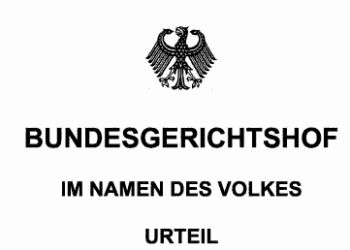Confernation
The “Right to be Forgotten I” decision published today, which is complemented by the “Right to be Forgotten II” decision of the same day(see this post), concerns a dispute that is within the scope of Union law, but which may be structured differently by Member States. The First Senate of the Federal Constitutional Court has therefore applied the fundamental rights of the Basic Law and granted a constitutional appeal against a judgment of the Federal Court of Justice. The complainant had dismissed an action brought by the complainant against the unrestricted provision of press reports in an online archive more than 30 years ago, in which he was convicted by name of his conviction for murder. has been reported.
The Federal Constitutional Court first clarified its standard of examination in the context of EU law. According to that court, if specialised law is not fully harmonised under EU law and is structured differently in the Member States, it examines its interpretation primarily on the basis of the fundamental rights of the Basic Law, even if, at the same time, the fundamental rights of the European Union are also Apply. This is based on the assumption that EU law, which is open to design, is based on a variety of fundamental rights assessments and on the presumption that the application of German fundamental rights is the only framework to protect the fundamental rights of the European Union. co-guaranteed. A supplementary examination of the fundamental rights of the European Union is only necessary if there are concrete and sufficient indications that the protection of the Basic Law is not sufficient.
On the substance, the Senate states that claims for protection against the dissemination of old press reports in an online archive are based on a weighing up of the fundamental rights at issue, in which time is subject to the terms of communication of the Internet. particularly important (“right to be forgotten”). In doing so, account must be taken of the extent to which the publisher has the means to influence the dissemination of the old reports on the Internet in order to protect those affected, in particular on their searchability by search engines in name-related searches. Such claims are based on the dimensions of the protection of general personal rights in contrast to the right to informational self-determination.
Facts
1. The complainant was convicted of murder in 1982 and sentenced to life imprisonment for shooting two people on board a yacht on the high seas in 1981. Der SPIEGEL published three articles in its printed edition on the case in 1982 and 1983, in consideration of the person of the named complainant. Since 1999, the complained Spiegel Online GmbH has been providing the reports in an online archive free of charge and without barriers to access to access. If the complainant’s name is entered in a popular internet search portal, the articles will be displayed under the first hits.
After first becoming aware of the online publication in 2009, the complainant, who had been released from custody in 2002, brought an action for an injunction on the defendant’s request to prohibit the defendant, citing his family name. The Federal Court of Justice dismissed the action. In the event of a dispute, the complainant’s interest in protecting his personality must be retracted behind the public interest in information pursued by the defendant and its right to freedom of expression. The public has a commendable interest in informing themselves of past historical events such as the A. process, which is inextricably linked to the person and name of the complainant, on the basis of unchanged original reports.
2. With his constitutional complaint, the complainant complains of a violation of his general right of personality. Even with his deed, he did not come back into the public eye and today he wants to shape his social relations unencumbered by it. On the other hand, when entering his name in the context of a search engine search, which is widely used today, third parties are primarily directed to these reports. This seriously affected him in the development of his personality. The murder trial at that time was indisputably a historical event; however, after such a long period of time, this does not necessarily lead to a continuing public interest in naming his name.
Key considerations of the Senate
Ⅰ. The procedure gives rise, first of all, to specify in more detail the constitutional review of the fundamental rights of the Basic Law in the context of EU law and to clarify it in relation to possible EU fundamental rights which are applicable at the same time.
1. The Federal Constitutional Court examines national law and its application in principle on the basis of the fundamental rights of the Basic Law, even if it is within the scope of EU law, but is not fully determined by it, as in this case. . This also applies in so far as, in individual cases, in accordance with Article 51(4) of the 1 Sentence 1 grCh also claims the Charter of Fundamental Rights of the European Union.
a) The examination of files of the German public authority in accordance with the Basic Law corresponds to the general function of the Federal Constitutional Court, whose task is precisely to uphold the Basic Law, and at the same time Article 23(2) of the Federal Constitutional Court. 1 GG, which provides for participation in the European Union, which is committed to federal principles and the principle of subsidiarity. This is in line with the European Treaties and the case law of the European Court of Justice. The preambles to the Treaty on European Union and the Charter of Fundamental Rights recognise the diversity of cultures and traditions, and respect for the diversity of fundamental rights protection is also reflected in the provisions of the Charter. Accordingly, Article 5(5) of the 3 TEU the principle of subsidiarity to the fundamental principles of the European Union, which is set out in Article 51(1) 1 sentence 1 GRCh for the protection of fundamental rights is expressly included.
(b) The primary application of the fundamental rights of the Basic Law is based on the fact that, where it gives Member States room for manoeuvre, EU law does not regularly aim at uniformity of the protection of fundamental rights and on the presumption that thereis a the level of protection of EU law, which is aimed at diversity, is guaranteed by the application of the fundamental rights of the Basic Law.
(aa) If the EU legislature leaves the Member States room for manoeuvre for the implementation of EU law, it must be assumed that this also applies to the protection of fundamental rights. Following the case law of the European Court of Justice, it can be assumed here on a regular basis that the European level of protection of fundamental rights within an external framework of EU law allows for a diversity of fundamental rights. The extent to which there is scope for different assessments of the Member States is largely governed by EU law. However, this may also include fundamental rights requirements for the implementation of Member States’ freedom of design. In that regard, the relationship between technical law and fundamental rights is less static in EU law than under the German Constitution.
bb) If it is to be assumed that the right to fundamental rights is geared towards the diversity of fundamental rights, the Federal Constitutional Court may rely on the presumption that, by examining the standard of fundamental rights of the Basic Law, the level of protection of the Charter as set out by the European court is generally guaranteed.
This presumption is based on an overarching attachment of the Basic Law and the Charter to a common European tradition of fundamental rights, which in particular has a foundation in the European Convention on Human Rights. Accordingly, both the Charter and the fundamental rights of the Basic Law are interpreted in the light of the Convention on Human Rights.
cc) The primary application of the fundamental rights of the Basic Law does not mean that the Charter of Fundamental Rights is not taken into account. On the contrary, the fundamental rights of the Basic Law must be interpreted in the light of the Charter. This does not call into question the autonomy of the fundamental rights of the Basic Law, nor does its interpretation arise from the experience of German history and taking into account the specific structures of the legal order and social reality of the Federal Republic. It is not guaranteed from the outset that the fundamental rights guarantees of the Basic Law and the Charter of Fundamental Rights are identical in all respects. The importance of other sources of fundamental rights for the interpretation of fundamental rights is a question of individual cases and depends in particular on the rank, content and relationship of the interdependent legal norms. In that regard, an interpretation in the light of the Charter may differ from an interpretation in the light of the Convention on Human Rights.
2. The sole use of the fundamental rights of the Basic Law as a criterion for the examination of national law, which serves the implementation of EU law open to the rule of law, does not apply without exception.
(a) On the one hand, the technical law may exceptionally contain stricter provisions of fundamental law, even to the extent that it leaves the Member States room for manoeuvre. On the other hand, in so far as the technical law opens up room for diversity in fundamental rights, the presumption of sufficient protection of fundamental rights by the fundamental rights of the Basic Law is rebuttable. Without prejudice to the substantial harmony of the guarantees of fundamental rights on the basis of the Convention on Human Rights, the Member States, in their fundamental rights traditions, point out the compensation and legalisation of conflicts of fundamental rights by their history and reality of life, which the Charter can and does not want to unify.
(b) An examination on the basis of German fundamental rights alone is not sufficient only if there is concrete and sufficient evidence that this could not respect the fundamental level of protection of EU law.
(aa) Indications that, exceptionally, eucompetition law is intended to contain specific fundamental rights requirements for the member states’ scope for manoeuvre must be based on the wording and regulatory context of the technical law itself. Restrictions in that regard are not based on the fact that special EU law refers to full respect for the Charter of Fundamental Rights or some of its provisions.
bb) A possible rebuttal of the presumption that the application of the fundamental rights of the Basic Law ensures the fundamental level of protection of the Union must also be pursued only in the case of concrete and sufficient evidence. If it is apparent that the European Court of Justice is based on specific standards of protection which are not guaranteed by German fundamental rights, this must be included in the examination. The same applies if the level of protection applicable in individual cases derives from rights of the Charter which have no equivalent in the Basic Law.
(c) Exceptionally, if the German fundamental rights do not guarantee the level of protection of the Charter, the corresponding rights of the Charter must be included in the examination in that regard. In so far as unresolved questions arise as to the interpretation of the Charter, the Federal Constitutional Court shall refer them to the European Court of Justice in accordance with Article 267(1). 3 TFEU. Otherwise, the Federal Constitutional Court must include THE fundamental rights of the European Union in its standard of examination and apply them in principle (compare the decision of the same day, PM No 84/2019).
3. The primary use of the fundamental rights of the Basic Law by the Federal Constitutional Court does not call into question the direct applicability of the Charter of Fundamental Rights in its scope. Accordingly, the specialised courts may, in that regard, address questions of interpretation relating to EU law in accordance with Article 267(1). 2 TFEU. This does not affect the fact that, in so far as EU law leaves the Member States room for manoeuvre, the fundamental rights of the Basic Law must always be applied.
4. In the present proceedings, therefore, the fundamental rights of the Basic Law alone constitute the standard of examination. It is true that the dispute, which is to be decided by analogy under Paragraph 823, 1004 of the German Civil Code (BGB), is within the scope of EU law (namely, originally the Data Protection Directive 95/46/EC and now the General Data Protection Regulation). However, the distribution of press reports, which is in dispute here, falls within the so-called media privilege, the structure of which the Member States have a margin of manoeuvre under EU law. This is not a question of applying fully determinised EU law. There are no indications that the protection of fundamental rights under the Basic Law would not cover the level of protection of the Charter of Fundamental Rights here.
Constitutional complaint successful!
Ⅱ. The constitutional complaint was successful on the merits.
1. The subject-matter of the constitutional complaint is the granting of protection of fundamental rights in the relationship between private individuals. Fundamental rights here apply by means of indirect third-party effect. In this respect, the fundamental rights at issue must be weighed up.
a) On the part of the appellant, his general right of personality (Art. 2 sec. 1 in conjunction with Art. 1 sec. 1 GG) must be discontinued in its dimensions of protection under the law of expression, but not the right to informational self-determination.
The general right of personality in its dimensions under the law of expression provides protection against personal reporting and dissemination of information which is likely to significantly impair the development of personality. It protects against the dissemination of personal reports and information in public spaces as a result of a communication process. Risks to the development of personality arise here primarily from the form and content of the publication itself. Its protection content must not be defined in its exhaustive terms, which are to be distinguished from each other, but must be worked out in relation to the specific need for protection on a case-by-case basis and in comparison with the fundamental rights of third parties. The protection of the general right of personality is flexible in this respect and is relativised by the involvement of the person in his social relations. Accordingly, the right of personality does not enfollow a comprehensive right of disposal of the representation of one’s own person, which is left solely to the individual. However, it aims to ensure the basic conditions for the individual to develop and maintain his or her individuality in a self-determined manner.
The right to informational self-determination as a separate expression of the general right of personality must be distinguished from this. It may also have significance in civil law by means of indirect third-party effect. It provides protection against third parties taking over individual data and using it in an incomprehensible way as an instrument to determine the characteristics, types or profiles over which they have no influence, but which are in the process of free development of personality and equal participation in society are of considerable importance. In this respect, its effect between private individuals differs from its directly state-directed protective effect. In particular, requirements and justification burdens cannot be formally determined in the same way here, but must be determined by weighing up the different situations between private individuals according to the need for protection. Nor does the right to represent one’s own person establish a general or even comprehensive right of self-determination over the use of one’s own data. However, it ensures that individuals have a differentiated influence on the context and way in which their own data is accessible to others and used by them. It thus provides a guarantee that attributions which apply over one’s own person will have a substantial decisive decision.
b) On the part of the defendants, freedom of expression and freedom of the press (Art. 5 sec. 1 sentence 1 and 2 GG) must be taken into account. On the other hand, the freedom of broadcasting coverage is not affected by the posting of reports in an online archive. The dissemination of information is not always subject to freedom of broadcasting when it uses electronic information and communication systems.
2. The fundamental rights at issue must be weighed up with each other, for which their respective guarantee content must first be recorded. In particular, the communication conditions of the Internet must also be taken into account.
a) The temporal circumstances have always been important for the balance between freedom of the press and the protection of personal rights. While the case law for the current reporting of criminal offences generally gives priority to the interest of information and, in any case, also considers identifying reports to be admissible in principle with regard to convicted offenders, at the same time, it has made it clear that the legitimate interest in identifying reporting decreases with increasing time lag to the action.
However, in the current conditions of information technology and the dissemination of information through the Internet, the integration of information into time takes on a new legal dimension. Whereas information used to be accessible to the public only within a narrow time frame than print media and broadcasts, and then fell into a wide range of oblivion, today it remains – once digitised and put on the internet – long-term Available. In time, they not only unfold their effect filtered through the fleeting remembrance in public discourse, but remain immediately accessible to all. The information can now be taken up at any time by completely unknown third parties, become the subject of discussion on the net, can be decontextualized new meaning and in combination with further information on profiles of the personality as is common through search engines through name-related queries.
(b) In interpreting and applying the general right of personality, account shall be taken of this. Freedom involves developing and changing personal beliefs and one’s own behaviour. This requires a legal framework that makes it possible to exercise one’s freedom in an intimidating manner and opens up the opportunity to put errors and mistakes behind. The legal system must therefore protect against the fact that a person must be held indefinitely before the public. Only the possibility of resigning past facts opens up the opportunity for a new beginning in freedom. The possibility of forgetting is part of the temporality of freedom. Visually, this is also partly referred to as the “right to be forgotten” or the “right to be forgotten”.
However, the general right of personality does not give rise to a ‘right to be forgotten’ in a sense which can be controlled in principle by the persons concerned alone. In this respect, what information is recalled as interesting, admirable, offensive or reprehensible is not subject to the unilateral disposition of the person concerned. The general right of personality does not therefore give us the right to have all previous personal information exchanged in the course of communication processes deleted from the Internet.
(c) On the other hand, due account shall be taken of the protection content of freedom of expression and the press. Limiting anonymised reporting means a significant restriction on information opportunities for the public and the right of the press to decide for itself what it reports on, when, for how long and in what form. Such archives provide easy access to information and are also an important source of journalistic and contemporary research. They also have an important role to play in education and public debate in democracy.
Conclusion
3. The following shall apply to the weighing of the balance to be made by the specialised courts:
a) In principle, a publisher may also post legally published reports in an online archive. Protective measures can only be required once those affected have contacted him and explained their need for protection in more detail.
(b) The importance of the time elapsed for the protection against an originally lawful publication is largely relevant to the impact and subject of the reporting, in particular the extent to which the reports affect private life and the possibilities of development of the person as a whole. In addition to the newly acquired context of the reports and the intermittent behaviour of the person concerned, it is important in which the information is communicated on the network under the specific circumstances. The burden on those affected also depends on the extent to which information is actually widely distributed on the Internet, for example to what extent it is communicated as a priority by search engines.
(c) In order to compensate, it is also necessary to take into account gradations as to the nature of possible protective measures on the part of the press publisher, which cushions the changing meanings of information over time. Compensation, which obtains unhindered access to the original text as far as possible, is to be sought, but it is sufficiently limited in case of need for protection – in particular against name-related search queries by means of search engines – but on a case-by-case basis.
4. The contested decision does not fully comply with these requirements. In the present case, it would have been necessary to consider whether reasonable arrangements could and should have been imposed on the defendant press undertaking in response to the complainant’s notification, which at least could have been used against the search engines’ ability to find the reports in the event of name-related search queries provide some protection without unduly hindering the report’s discoverability and accessibility.























